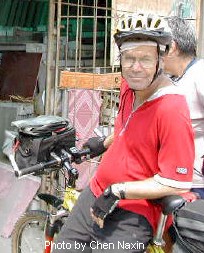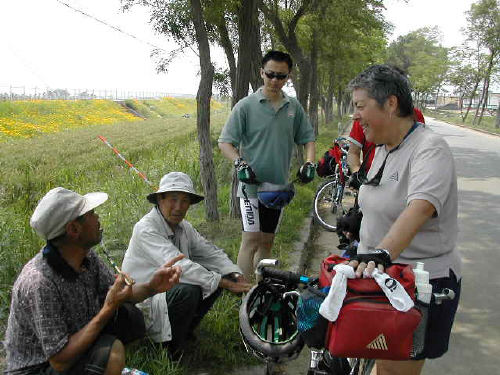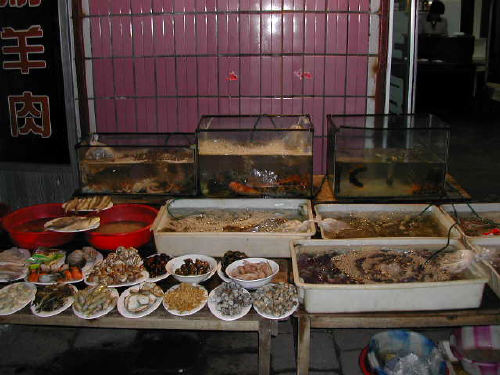China Cycling Travelogues
Do you have a China cycling travelogue you would like
to share here?
Contact us for details.

Stephen Shapiro
From Qingdao to the End of the World:
Bicycling China’s Shandong Peninsula
Copyright © Stephen Shapiro, 2002.
Part 3
We spent the night in Haiyang, a city of about 50,000 people, where we stayed in a Government run hotel, the simplest of our accommodations on the trip. It was fine, if a little musty. Most of the other nights between Qingdao and Weihei we stayed at three-star hotels, which were actually quite nice. At these hotels, we were the only non-Chinese guests and none of the staff spoke any English. When Donna and I took a stroll around town before dinner, it was clear from peoples’ reactions, that they did not see many Westerners. Here, as in Rushan and Wendeng, our next two stops, people stared at us as if we had dropped in from outer space. But if we made eye contact and said "nee how" or "Hello," they broke into big smiles and greeted us warmly in return. Unfortunately, we couldn’t really communicate with anyone, since the only Chinese we knew was "nee how" (hello), "shay shay" (thank you) and "bing pijo" (cold beer, which I make it a point to be able to say in as many languages as possible); and the only English most Chinese knew was, "halloo," "bye-bye," and "Michael Jor-dan."

We did have a number of interesting encounters with locals along the road when Mike and Chen were available to translate for us. For example, a seventy-eight year old man who made a living selling chickens from his bicycle won Donna’s fifty-five year old heart when he guessed her age to be thirty. On another occasion, we stopped across the street from a road crew (symbolic of the contradiction that is China today, they were digging a trench with picks and shovels, so they could lay a new fiber optic cable). The men all stopped work and came over to meet us. Then one of them ran back across the street and returned to show us a prized possession: a medal, in English, awarded in 1937 by the Shanghai Government for heroic service (probably to some Englishman during the Japanese invasion). When we got ready to ride on our way, one of the men made the T for time-out sign with his hands. We waited, wondering why, and then a huge explosion about fifty yards ahead sent rocks showering on the road, where we had been about to ride.
The next morning, in order to ride out of Haiyang, we had to ride through several miles of urban bustle. Traffic in China, which is making a transition from mostly bicycles to more and more motor vehicles, is quite chaotic. Biking through a city is not for the inexperienced or faint of heart. There seemed to be no rules of the road whatsoever. We weaved our way along, as vehicles of all sorts came at us from every direction: taxis making left turns directly in our path, other bikes entering from cross streets without stopping, buses suddenly swerving into the bike lane to discharge passengers. It was nerve wracking but exhilarating pedaling through the commotion, trying not to have to come to a complete stop and put a foot on the ground, which in China signifies a loss of face for a bicyclist. I felt like a real Chinese rider, when, toward the end of the trip, all four of us made a left turn, from the right hand bike lane, across six lanes of traffic, against the light.

Fortunately, most of our ride was on rural roads, with less traffic. We did have to get used to the fact that Chinese bus and truck drivers seemed to feel that any maneuver, no matter how dangerous (like riding on the wrong side of the road or passing on a blind curve) was acceptable, as long as it was done with the horn blaring. Unfortunately, they used the same long horn blast to let you know that they were safely passing on your left as they did to warn you that they were about to crash into you. At first, I needed to suppress my bike rider’s instinct to jump off my bike upon hearing a huge truck bearing down from behind with its horn blaring. But after I got used to it, things were fine. Not only did we complete the trip without incident, (except for the time that Donna almost fell on her head while standing beside her bike and reaching for an apricot) but amazingly, we didn’t see a single accident the whole two weeks we were in China.

From Haiyong we headed away from the coast toward our final destination of Weihai, on the northeast tip of the peninsula. The riding became somewhat hillier as we crossed the peninsula. All along, we had passed many houses that had beautiful hand-painted ceramic tiles on either side of their front doors. We had admired these, and luckily Chen noticed a small store along the road that sold them. We stopped in, looked around and picked out a nice set of four tiles, which the store owner wrapped into a small package for us. While he was doing this, his wife pulled out another box, and began assembling an entire scene, composed of thirty-six tiles. It was really quite beautiful, and Donna decided we just had to have it. We bought it (for the equivalent of about eight dollars), but unfortunately, the set, which fit perfectly in my back bag, weighed twenty pounds. I carried this for the next day and a half, through sixty of the hilliest miles of our trip. For years, Donna has been threatening to put twenty pounds of rocks in my bike bags to slow me down, and she had finally succeeded.
We rode into Weihai the afternoon of our sixth day. When Donna heard me mention Weihai (pronounced "way high") as our final destination, she had been concerned, since I had told her earlier that our trip would not involve a lot of climbing. It turns out, however, that Weihai is on the coast at sea level, only about thirty kilometers from Chengshan Jiao, the Easternmost point on the peninsula. This is what the ancient Chinese called "The End of the World," unaware that Korea lay only a hundred and fifty miles to the east. Although we didn’t have time to ride there, we could see it from our twelfth floor hotel room at the beautiful four-star Weihaiwei Hotel.

After we checked into the hotel, Mike and Chen took us out for one last dinner together. We had been eating fabulous meals all along the trip. Most had been real feasts, with seven or eight dishes carefully picked out by Chen. Most Chinese restaurants are part restaurant, part aquarium. You pick out your food while it is still swimming or crawling and then negotiate with the wait staff as to how it will be cooked. These pre-dinner negotiations commonly take ten to fifteen minutes or more. Sometimes Chen even went into the kitchen to make sure things were prepared properly. We saw creatures that were clearly too cute or exotic for Western palates, such as turtles, sea horses, manta rays and sea worms (and in one restaurant a terrarium crawling with scorpions, waiting to be fried). Although we didn’t try any of these, we did taste sea cucumber and jellyfish, both of which we found too chewy. But other than that, we liked everything else Chen ordered. The whole steamed fish, seafood (clams, shrimp, prawns, crabs) and vegetables (green beans, eggplant, Chinese broccoli, bamboo shoots) were consistently delicious, usually stir fried in sauces laced with garlic, ginger and hot red peppers. We washed it all down with lots of Tsingtao beer. I managed to gain four pounds, even though we rode more than 200 miles that week.

The next morning we helped Chen and Mike take the bikes to the train station for shipment back to their home city of Chengdu and then we all took the six-hour bus ride back to Jinan, where we parted company. We thanked them for a wonderful trip and a look at China from the perspective not granted many westerners. Almost every minute, especially while biking through the countryside or walking through the cities, had been exciting and fascinating. Our regular European bike tour later this summer (through parts of Austria and southern Germany) is going to seem pretty tame this year.
From Qingdao to the End of the World: Bicycling China’s Shandong Peninsula Part 1 | Part 2 | Part 3
Bike China Adventures, Inc.
Home | Guided Bike Tours | Testimonials |
| Photos | Bicycle Travelogues
| Products | Info |
Contact Us
Copyright © Bike China Adventures, Inc., 1998-2012. All rights reserved.
